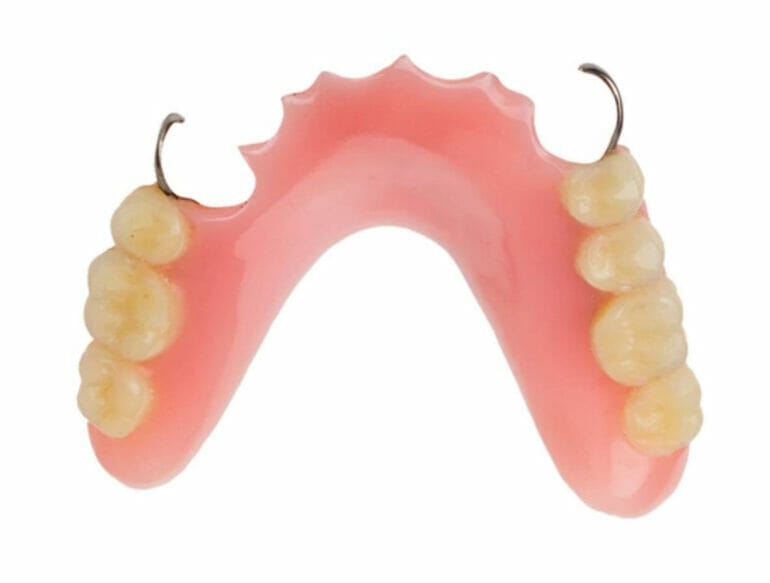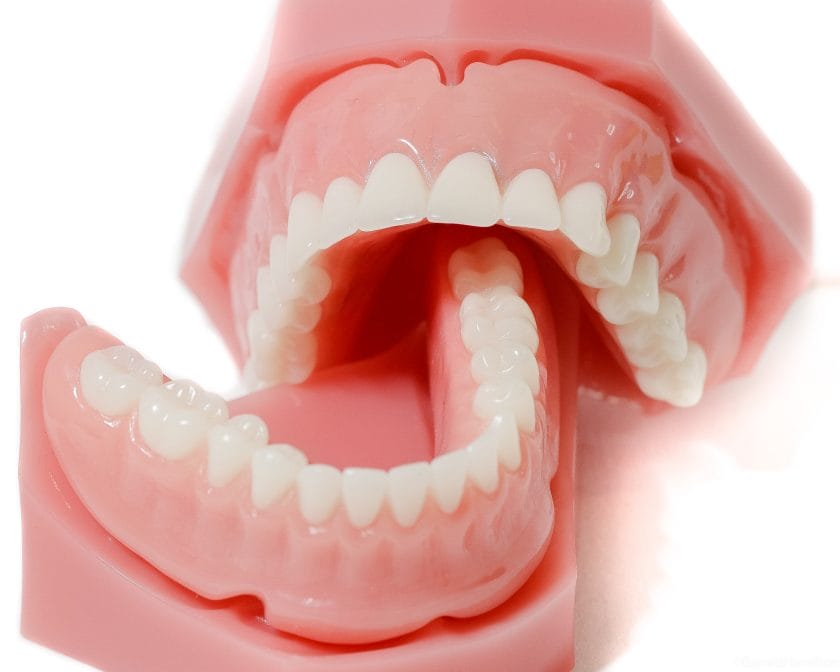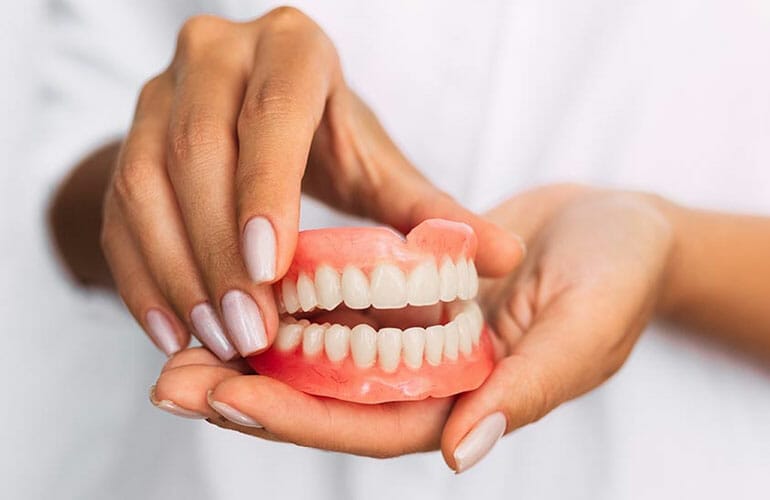Acrylic dentures are a popular and reliable option for replacing missing teeth. Made from a durable and lightweight material, acrylic dentures offer a comfortable fit and natural appearance.
They are easy to clean and maintain, making them a convenient choice for many individuals. Acrylic dentures also provide good functionality, allowing wearers to bite and chew with ease.
With advancements in technology, acrylic dentures can now be customized to match the shape, size, and color of your natural teeth, ensuring a seamless blend with your smile.

How to Care for Acrylic Dentures
Acrylic dentures are a popular option for replacing missing teeth. They are lightweight, durable, and easy to customize. However, like natural teeth, acrylic dentures require proper care to maintain their appearance and functionality. In this section, we will discuss some essential tips for caring for acrylic dentures.
1. Clean your dentures daily
Just like natural teeth, acrylic dentures need to be cleaned regularly to remove food particles, plaque, and bacteria. To clean your dentures, use a soft-bristled toothbrush or denture brush and a non-abrasive denture cleaner. Avoid using regular toothpaste as it can be too harsh and abrasive, causing scratches on the denture surface.
2. Handle your dentures with care
When handling your dentures, make sure to do so over a soft surface or a basin of water to prevent them from breaking if accidentally dropped. Avoid using hot water to clean or rinse your dentures, as it can cause warping or distortion of the acrylic material.
3. Soak your dentures overnight
It is recommended to remove your dentures at night and soak them in a denture-cleaning solution or plain water. Soaking helps to keep the dentures moist and prevents them from drying out, which can lead to warping or changes in shape.
4. Brush your gums and tongue
Even if you have dentures, it is still important to maintain good oral hygiene. Brush your gums, tongue, and the roof of your mouth with a soft-bristled toothbrush or a tongue cleaner to remove bacteria and stimulate blood circulation.
5. Visit your dentist regularly
Regular dental check-ups are crucial for the overall health of your mouth and dentures. Your dentist can examine your dentures for any signs of wear or damage and make necessary adjustments. They can also address any concerns or discomfort you may be experiencing.
6. Avoid using harsh chemicals
When cleaning your dentures, avoid using abrasive cleaners, bleach, or other harsh chemicals. These substances can damage the acrylic material and cause staining or discoloration.
7. Handle repairs professionally
If your dentures become damaged or broken, do not attempt to fix them yourself. Instead, contact your dentist or a dental laboratory to handle the repairs. Using DIY methods or adhesives can lead to further damage and compromise the fit and function of your dentures.
8. Store your dentures properly
When you are not wearing your dentures, it is important to store them properly to maintain their shape and prevent contamination. Store them in a denture container filled with clean water or denture-cleaning solution. Avoid using hot water, as it can cause deformation.
In summary, caring for acrylic dentures involves daily cleaning, proper handling, regular dental visits, and avoiding harsh chemicals. Following these tips will help ensure that your acrylic dentures remain comfortable, functional, and aesthetically pleasing for years to come.

Comparing acrylic dentures with other types of dentures
When it comes to replacing missing teeth, dentures have been a popular and effective solution for many years. Dentures not only restore the functionality of your teeth but also enhance your smile and boost your confidence. However, with advancements in dental technology, different types of dentures have emerged, each with its own set of benefits and drawbacks. In this section, we will compare acrylic dentures with other types of dentures to help you make an informed decision.
1. Acrylic Dentures
Acrylic dentures, also known as traditional dentures, are the most common and affordable type of dentures available. These dentures are made from a pink acrylic base that supports the artificial teeth. The pink base blends naturally with the gums, giving a realistic appearance. The artificial teeth are typically made from acrylic resin, which can be customized to match the color and shape of your natural teeth.
Acrylic dentures offer several advantages. Firstly, they are cost-effective compared to other types of dentures. This makes them a popular choice, especially for individuals on a budget. Additionally, acrylic dentures are relatively lightweight and easy to adjust or repair if needed. They are also suitable for patients with sensitive gums as they are less likely to cause irritation.
However, acrylic dentures do have their limitations. They are less durable than other denture materials and may require more frequent replacements over time. Additionally, they may be susceptible to staining and discoloration, requiring regular maintenance to retain their appearance. The acrylic material can also be more prone to wear and tear, resulting in potential cracks or breaks.
2. Porcelain Dentures
Porcelain dentures are known for their natural-looking appearance and durability. These dentures consist of a porcelain base and artificial teeth that are fused together. The porcelain material closely resembles the translucent quality of natural teeth, creating a realistic smile.
One of the key advantages of porcelain dentures is their resistance to staining and discoloration. This characteristic allows them to maintain their natural appearance over time. Additionally, porcelain dentures are highly durable and can withstand significant wear and tear without losing their shape or structure.
However, porcelain dentures are generally more expensive than acrylic dentures. The production process for porcelain dentures is more intricate, involving multiple steps, which contributes to their higher cost. Furthermore, porcelain dentures can be heavier than acrylic dentures, which may take some time to adjust to. They are also more prone to fractures if dropped or mishandled.
3. Flexible Dentures
Flexible dentures, also known as Valplast dentures, are made from a flexible resin material. These dentures offer a comfortable and discreet alternative to traditional dentures. The flexible material allows for a snug fit, reducing the chances of irritation or discomfort.
One of the main advantages of flexible dentures is their ability to blend seamlessly with the natural tissues of the mouth. The flexibility of the material allows the dentures to adapt to the movement of the surrounding oral structures, providing enhanced comfort. They are also more resistant to fractures and can withstand impact better than acrylic or porcelain dentures.
However, flexible dentures may not be as durable as other types of dentures. The material can wear down over time and may require frequent adjustments or replacements. They are also generally more expensive than acrylic dentures but less expensive than porcelain dentures.
Summary
Choosing the right type of dentures depends on various factors, including your budget, aesthetic preferences, and oral health condition. Acrylic dentures offer an affordable and lightweight option, while porcelain dentures provide a natural-looking appearance and enhanced durability. Flexible dentures offer flexibility and comfort but may require more frequent maintenance.
Consulting with your dentist is crucial to determine the most suitable type of dentures for your specific needs. They will take into account your oral health, lifestyle, and aesthetic goals to guide you towards the best denture option. Remember, regardless of the type of dentures you choose, proper oral hygiene and regular dental check-ups are essential to maintain your oral health and prolong the lifespan of your dentures.

The Durability of Acrylic Dentures
Acrylic dentures, also known as acrylic resin dentures, are a popular option for replacing missing teeth. These dentures are made of a type of plastic called acrylic resin, which is known for its durability and strength. In this section, we will explore the durability of acrylic dentures and why they are a reliable choice for dental prosthetics.
1. Material Composition
Acrylic dentures are made from a high-quality acrylic resin, which is a type of plastic that is known for its durability and longevity. This material is not only strong but also resistant to impact and wear, making it an ideal choice for dental prosthetics.
2. Resistance to Fracture
Acrylic dentures are designed to withstand the forces generated during chewing and biting. The material used in these dentures has a high level of resistance to fracture, meaning that they are less likely to break or crack under normal usage.
The acrylic resin used in dentures is also resistant to staining, which helps to maintain the aesthetic appearance of the dentures over time. This means that with proper care and maintenance, acrylic dentures can retain their original color and appearance for an extended period.
3. Comfort and Fit
One of the key factors contributing to the durability of acrylic dentures is their comfortable fit. Dentists take precise measurements and impressions to ensure that the dentures fit snugly on the gums and surrounding tissues.
This customized fit not only enhances comfort but also helps to distribute the biting and chewing forces evenly. As a result, the pressure exerted on the dentures is evenly distributed, reducing the risk of damage or breakage.
4. Impact Resistance
Acrylic dentures have excellent impact resistance, meaning that they can withstand accidental drops or falls without significant damage. This durability ensures that the dentures can withstand the normal wear and tear of daily use.
However, it is important to note that while acrylic dentures are durable, they are not indestructible. Excessive force or improper handling can still cause damage to the dentures. Therefore, it is essential to handle them with care and follow the instructions provided by your dentist for cleaning and maintenance.
5. Longevity
The durability of acrylic dentures contributes to their longevity. With proper care and regular dental visits, acrylic dentures can last for several years before they need to be replaced. However, it is important to note that over time, the structure of the mouth and gums may change, requiring adjustments or replacement of the dentures.
In summary, acrylic dentures are known for their durability and resistance to fracture. The high-quality acrylic resin used in these dentures ensures their longevity and ability to withstand the forces of chewing and biting. With proper care and maintenance, acrylic dentures can provide patients with a reliable and long-lasting dental prosthetic solution.
Common misconceptions about acrylic dentures
Acrylic dentures are a popular choice for individuals who have lost their natural teeth. However, there are several misconceptions surrounding acrylic dentures that need to be debunked. In this section, we will address these misconceptions and provide accurate information about acrylic dentures.
1. Acrylic dentures are uncomfortable
One of the most common misconceptions about acrylic dentures is that they are uncomfortable to wear. However, this is not true. Acrylic dentures are custom-made to fit the unique shape of an individual’s mouth, ensuring a comfortable and secure fit. Additionally, advancements in dental technology have improved the design and materials used in acrylic dentures, making them more comfortable than ever before.
2. Acrylic dentures look fake
Another misconception is that acrylic dentures look fake and unnatural. While it is true that poorly made or ill-fitting dentures can appear artificial, a well-crafted set of acrylic dentures can provide a natural-looking smile. Denture technicians carefully match the color, shape, and size of the dentures to blend seamlessly with the individual’s remaining natural teeth, resulting in a natural and aesthetically pleasing appearance.
3. Acrylic dentures require extensive maintenance
Some people believe that acrylic dentures require complicated and time-consuming maintenance. However, caring for acrylic dentures is relatively simple. Regular brushing with a soft toothbrush and denture cleaner or mild soap is sufficient to keep them clean. It is important to avoid using abrasive materials or harsh chemicals, as they can damage the dentures. Additionally, removing the dentures at night and soaking them in a denture cleanser or water can help maintain their integrity.
4. Acrylic dentures are fragile
It is a common misconception that acrylic dentures are fragile and prone to breakage. While acrylic is not as strong as other materials like porcelain, modern acrylic dentures are designed to be durable and withstand the pressures of daily use. However, it is essential to handle them with care and avoid dropping them to prevent any damage.
5. Acrylic dentures restrict diet
Some individuals believe that wearing acrylic dentures means they will have to give up certain foods. While it is true that initially, individuals may need to avoid hard or sticky foods to allow their mouths to adjust to the dentures, most individuals can eventually enjoy a wide range of foods with acrylic dentures. Denture wearers are encouraged to practice proper chewing techniques and cut food into smaller, more manageable pieces to enhance comfort and prevent any damage to the dentures.
In summary, acrylic dentures are a comfortable and natural-looking option for individuals who have lost their natural teeth. They do not require extensive maintenance, are designed to be durable, and do not restrict an individual’s diet. It is important to consult with a dental professional to ensure a proper fit and to address any concerns or questions regarding acrylic dentures.
Frequently Asked Questions
Are acrylic dentures a good option?
Yes, acrylic dentures are a popular and effective option for replacing missing teeth. They are lightweight, durable, and can be made to look natural. However, they may not be as strong as other materials like metal or porcelain, so it’s important to discuss your specific needs with your dentist.
Conclusion
In conclusion, acrylic dentures are a popular and reliable option for replacing missing teeth. Their lightweight and comfortable design make them a preferred choice for many patients. With advancements in technology, acrylic dentures have become more natural-looking and durable, providing a natural smile and improving the chewing function. Furthermore, acrylic dentures are relatively affordable compared to other tooth replacement options. However, it is essential to maintain proper oral hygiene and regular dental visits to ensure the longevity and functionality of acrylic dentures. Overall, acrylic dentures are a good choice for individuals seeking an effective and affordable tooth replacement solution.
